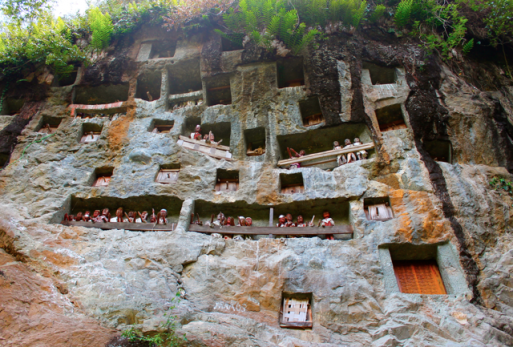In the South Sulawasi province of Tana Toraja, Indonesia, lives a culture where death doesn’t automatically mean saying a clear-cut goodbye to our loved ones. Close to half a million Indonesians live in the region, which has held fast to its cultural identity despite the Dutch colonial influences of the turn of the century. The Toraja are a predominantly Christian people, but they have become famous – or somewhat infamous, depending on your stances on death and dying – for their animistic funeral traditions.
“The Toraja have become famous – or somewhat infamous, depending on your stances on death and dying – for their animistic funeral traditions.”
Today, tourists flock to the region to observe the funeral rites that create a sense of festivity and community in lieu of the traditional somber and severe goodbyes of Western funerals. Animism refers to a belief that everything – be it a plant, animal, or grandparent – has a cherished soul that we must take the time to say goodbye to. Known to the indigenous peoples as Aluke To Dolo (“Way of the Ancestors”), animism allows for a healthier, more gradual acceptance of death. A traditional Toraja funeral does not see death as an ominous, foreign end – it is not something that is hurried along and processed only to be forgotten, but rather acts as a sort of commencement ceremony; a continuation of the loved one’s life after they have died.
This means that after a joyously raucous ceremony, the loved one rests at home. They continue to be dressed in their favourite trousers, they are ever present for family dinners and even carry on relationships with loved ones. “[It’s] a community of people that experience death as a gradual social process,” says anthropologist Kelli Swazey, “[which] have made death the most visible part of the landscape.” Swazey’s husband, a native of the region, says he has lovely memories of “his enduring relationship with his grandfather” after his passing. In time, the loved ones who have passed are buried – but it’s all part of their being accepted, very gradually, as ancestors. At the time of his grandfather’s death, Swazey’s husband was just a child. Today, he says that the time he spent “talking to and even playing with his deceased grandfather” resonates a unique love and comfort within him.
“Today, he says that the time he spent “talking to and even playing with his deceased grandfather” resonates a unique love and comfort within him.”
Swazey discussed her perspective of the culture in a recent TED Talk, saying that although “it [may] sounds strange to Western sensibilities,” the Toraja perspective on death and dying “could actually be a truer reflection of the fact that relationships with loved ones don’t simply end when breathing does.” And if “you can ritually weave someone’s life story into the history of your community [after their passing],” you inherently strengthen the bond between their story and your own. In the end, the two become one in the same, unfettered by physical death.
Watch Swazey’s TED Talk Below:
How would you feel observing such a tradition? We look forward to your comments below.
Related SevenPonds Articles:
- The Jamaican Tradition of Nine Nights
- Preserving the Totem Poles of the Northwest
- Taking the Time to Say Goodbye: Vietnamese Funeral Customs

 Tana Toraja, Indonesia: Where Death is Never a Severe Goodbye
Tana Toraja, Indonesia: Where Death is Never a Severe Goodbye




 First the Wealth Gap, Now the U.S. Has a Growing Health Gap
First the Wealth Gap, Now the U.S. Has a Growing Health Gap
 How to Comfort A Dying Loved One
How to Comfort A Dying Loved One
 Our Annual Seven Holiday Gifts for Someone Who Is Grieving, 2024 Edition
Our Annual Seven Holiday Gifts for Someone Who Is Grieving, 2024 Edition














